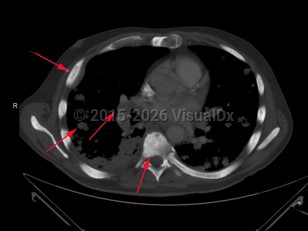Metastatic prostate carcinoma
Alerts and Notices
Important News & Links
Synopsis

Prostate gland carcinoma that has disseminated. Metastatic prostate carcinoma is seen less frequently due to prostate-specific antigen screening, which enables early diagnosis of prostate cancer while it is still localized. Malignant cells can appear throughout the body as cancer advances, with the bones and lymph nodes more commonly affected.
In patients with bone metastasis, the axial skeleton is often involved. Common findings include bone pain, pathologic fracture, and spinal cord compression may be observed. Patients with lymph node involvement will present with regional or cervical lymphadenopathy. Masses may also be observed, especially in the neck. The skin, liver, and penis are also reported areas of involvement.
The findings of advanced prostate cancer include perineal pain, weight loss, and urinary changes such as frequency, retention, dysuria, and hematuria. Physical exam may reveal areas of induration, asymmetry, and/or prostate nodule. Risk factors include advancing age, family history, obesity, poor diet, elevated insulin levels, and vitamin E supplementation. More common in individuals of African descent.
In patients with bone metastasis, the axial skeleton is often involved. Common findings include bone pain, pathologic fracture, and spinal cord compression may be observed. Patients with lymph node involvement will present with regional or cervical lymphadenopathy. Masses may also be observed, especially in the neck. The skin, liver, and penis are also reported areas of involvement.
The findings of advanced prostate cancer include perineal pain, weight loss, and urinary changes such as frequency, retention, dysuria, and hematuria. Physical exam may reveal areas of induration, asymmetry, and/or prostate nodule. Risk factors include advancing age, family history, obesity, poor diet, elevated insulin levels, and vitamin E supplementation. More common in individuals of African descent.
Codes
ICD10CM:
C61 – Malignant neoplasm of prostate
SNOMEDCT:
94503003 – Secondary malignant neoplasm of prostate
C61 – Malignant neoplasm of prostate
SNOMEDCT:
94503003 – Secondary malignant neoplasm of prostate
Differential Diagnosis & Pitfalls

To perform a comparison, select diagnoses from the classic differential
Subscription Required
Best Tests
Subscription Required
References
Subscription Required
Last Updated:02/18/2016
Metastatic prostate carcinoma

